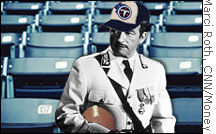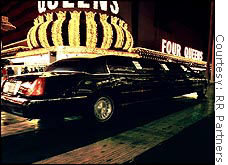
NEW YORK (CNN/Money) - The National Football League is borrowing a page from the playbook of Capt. Louis Renault.
Renault, the French officer played by Claude Rains in "Casablanca," profits from rigged gambling at Humphrey Bogart's night club. But when his Nazi masters order him to come up with a reason to shut down the club, he turns to Bogart and with a straight face tells him, "I'm shocked, shocked to find that gambling is going on in here."
At that moment the croupier hands Renault a large wad of bills and says, "Your winnings, sir." And Renault, not missing a beat, stuffs them in his pocket while saying, "Oh, thank you very much. Everyone out at once."
 |
|
| Capt. Louis Renault would feel very comfortable with the NFL's policy on gambling. |
Well, the NFL is doing roughly the same thing in rejecting a 30-second ad from the Las Vegas Convention and Visitors Authority for next week's Super Bowl.
The league profits from television broadcast rights that dwarf any other sport -- about $2.2 billion a year from its four broadcast networks, which is more than the combined annual payments from broadcasters to the National Basketball Association, Major League Baseball, National Hockey League, Nascar and the top two tennis tournaments.
It gets the money because ratings are so strong, even for games without a local team. That NFL rights windfall doesn't even include the $400 million a year the league will be getting from a new deal with DirecTV for showing only out-of-market games to fans with satellite television.
To deny that fans' betting on games is at least part of the reason for strong ratings, satellite TV packages and the dollars that follow is akin to ignoring the gambling taking place in Bogart's club. But the league wants everyone to believe it is shocked, shocked by the idea of sports gambling and wants nothing to do with it.
"No one can deny that just the name Vegas implies sports betting," said NFL spokesman Brian McCarthy, explaining why the league's existing casino ad ban was extended to the more general tourism spot.
 |
|
| The NFL banned this ad from for Las Vegas tourism from the Super Bowl for fears it would hurt its reputation. |
"We're not naive to think that sport gambling doesn't exist," he said. "It's our position that people are watching the game because they're great games. We don't believe it directly fuels the great ratings of the Super Bowl or any other game."
You, eh, bet, Brian.
"The NFL knows exactly the reason the NFL is popular is because it's the most gambling-friendly sport," said Wayne Allyn Root, chairman of Gwin, a publicly traded sports handicapping firm. "Without Las Vegas and sports gambling, they wouldn't be prime time, they wouldn't be Madison Avenue's favorite."
Of course the Las Vegas people are playing the same nudge-nudge, wink-wink game, with an ad campaign that makes only passing reference to gambling. The amount that will be wagered on next Sunday's game has nothing to do with why they wanted to pay about $2 million of a total $58 million ad budget for one 30-second spot on this year's big game.
"We looked at it simply from point of reaching leisure travelers," said Rossi Ralenkotter, vice president of the Las Vegas convention group.
Keeping the confidence of gamblers
It sounds counterintuitive, but it is partly the NFL's desire to keep the trust of the fans who gamble that makes league officials go as far as they do to keep a distance from anything that suggests gambling. They don't want gambing fans to believe the league is in bed with someone on the other side of the bet.
| SportsBiz
|

|
|
|
|
The league makes its injury reports public each week, allowing fans to believe that the person they're betting with or those setting the betting line don't have inside information they do not. But even in that policy, the NFL denies it is catering to gamblers.
"It was instituted not to aid gamblers, but the reverse, so that Vegas gamblers can't infiltrate a team to get an advantage," said McCarthy.
But if fans who like to gamble were to suspect that any of the games were rigged by gambling interests, it would be a disaster for the league.
"The concern is if there is any question about the integrity of the game or the sport, it would have a horrendous effect on the whole financial structure of sport itself," said Neal Pilson, former head of CBS Sports, who once had Las Vegas oddsmaker Jimmy the Greek as part of his pregame show, but never allowed him to mention the point spread.
"The league has huge concerns about being associated with gambling, so I understand banning the Las Vegas ad, even if I don't agree with it," Pilson added. He said he doesn't believe that gambling is a huge ratings driver for football, but admitted the impact is impossible to quantify.
| Related columns
|

|
|
|
|
Of course the combination of football's popularity, and the limited number of games, allows it to take the high road with its advertising policy, turning down ads not just from Las Vegas but from any casino or resort, even if it doesn't offer sports betting.
Other sports have far more games and far fewer viewers. That makes them more anxious to fill commercial openings, leading them to allow ads from Indian casinos and other gambling venues without sports books. The NBA is even considering relocating one of its Women's National Basketball Association teams to the Foxwood Indian casino in Connecticut.
It'll be interesting to see if the gambling ad ban stays in effect when the NFL starts its year-round 24-hour cable and satellite TV network. McCarthy says the league is not ready to talk about plans for the network yet. When it suddenly has a huge inventory of ad time to sell, it may find itself following another line from Capt. Renault.
"Round up the usual suspects."

|

